War takes a terrible toll, not just in lives lost but in psyches shattered. Depression in the armed forces is widespread, and suicide rates among members of the military are higher than they’ve ever been. In addition to more traditional treatments, soldiers have been looking to video games to help them cope with the horrors of war. And it’s working.
Stephen Machuga, founder of the non-profit charity Operation Supply Drop that provides these men with video games, corroborated the situation with me over Skype in August. “Right now there is a huge military suicide problem with veterans and active duty soldiers who just can’t cope with what they have been through,” says Machuga. “July of last year the suicide rate in Afghanistan was higher than the killed-in-action count, over 150 suicides. That is a huge problem.”
And it’s a problem Machuga believes video games can help fix. He and his charity are making games make a difference.
Whether facing the inexorable tensions of awaiting combat or returning home with traumatic injuries and psychological scars, soldiers are faced with the reminder that they are at war 24 hours a day, seven days a week. There is no break. It’s nothing new that video games can alleviate the effects of disorders like PTSD, but in their immersive nature they can also provide a sense of escapism for active troops. Operation Supply Drop, a non-profit charity that aims to put games in the hands of those deployed in combat zones and recovering military hospitals, is helping games to do just that.
“When you get guys playing Madden 13 together or having a Call of Duty tournament, it keeps them involved with one another, talking smack, having a good time, and just being guys or gals. It keeps them happy, keeps them smiling. And that makes all the difference,” Machuga told me over Skype.
As a former airborne Army Ranger, Machuga had his own problems serving overseas and readjusting to civilian life. “The concept for OSD came when I was deployed in Iraq,” he explains. “Anyone who has been deployed downrange is familiar with getting care packages from church groups or nursing homes — they will send packages of random things slapped together. Sometimes they’re good, sometimes they’re not so good.”
He goes on to explain that, despite the good intentions of the packages, they don’t contribute to the troops’ overall morale. Even after returning home, Machuga was influenced by the stresses of his deployment; he often feared that IEDs (Improvised Explosive Devices) were hidden in trashcans, as insurgents often target trashcans or piles as easy locations to conceal them. In time, however, he was able to find help in the form of video games, something that eventually became a form of therapy for him, as well as for the hundreds of others the charity has aided.
Personal Accounts
On May, 16 2013, 22-year-old infantryman Brett Claycamp was with his troop in Wardak, Afghanistan when he was hit by a rocket.
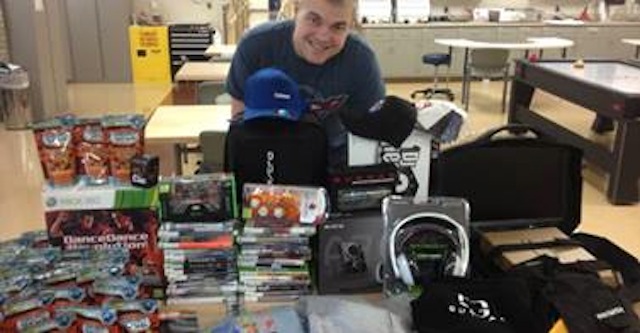
“I got shrapnel to both arms and legs and major nerve damage to my right arm,” he explains. With the extensive nerve damage caused by the embedded shrapnel, Claycamp had to undergo an emergency open stomach surgery overseas prior to getting medevaced to Walter Reed National Military Medical Center in Bethesda, Maryland. If his ongoing procedures go well, it will take two years for his arm to regain its full range of motion. “Needless to say, I’m really looking forward to that Xbox One,” he jokes. But jokes aside, he is quick to point out that there is not much to laugh about in terms of his endeavours; his thoughts often dwell on his friends overseas or his injury.
“If I didn’t have these video games I would go crazy. I don’t like to read and my thoughts often go back to downrange, wondering what’s going on with my fellow infantryman…” – Claycamp
“Operation Supply Drop reached out to me as a wounded warrior,” says Claycamp. “Ever since my injury I have been a little on the edge… constantly asking, ‘Is my arm ever going to be the same again’ or ‘how many surgeries do I have left?’ I often times wonder if people are after me or my friends who are still overseas fighting.”
But according to Claycamp, video games have helped him to put his mind at ease. The care package he received from Operation Supply Drop contained everything from loads of games and a portable TV to Magic the Gathering cards. “To be honest, I’ve never played Magic before. But I asked around and I’m just going to say that my Friday nights are a little different now! Playing games and cards really keeps me calm and away from the hard times I have.”
Even when overseas, Claycamp is able to use video games to help him take his mind off of war and make him feel more at home. But being at Walter Reed has brought different challenges to him. His injury has limited the amount of physical activity he can partake in and the hospital has very little to do to help him keep his mind off what occurred in Afghanistan. He credits the care package from Operation Supply Drop for the ease of transition he experienced on his road to recovery. “If I didn’t have these video games I would go crazy. I don’t like to read and my thoughts often go back to downrange, wondering what’s going on with my fellow infantryman… now when I’m not in school or studying I am being the next big draft pick on Madden or killing zombies in Call of Duty. Operation Supply Drop has done wonders for me.“
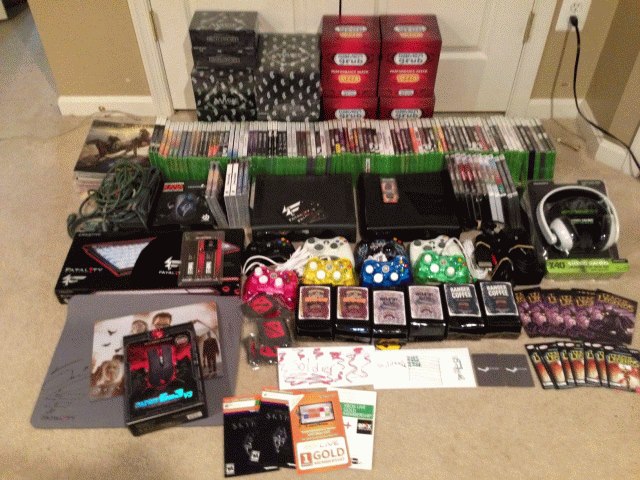
“A lot of places we go now are not supportive of the military,” says Sergeant Teddy Simmons of the U.S Army. Simmons found Operation Supply Drop while searching for a way to boost the morale of the of the Special Forces team he worked with in Afghanistan. “The ODA (Operational Detachment-Alpha or Special Ops) have a different mission than most traditional army troops,” he continues. “Often times it is much more intense. They come back from day-long patrols, exhausted and mentally drained. They needed a break from the feeling that they are at work or in danger 24 hours a day seven days a week. For them games are an outlet. Nothing really compares to their ability to immerse players.”
“They needed a break from the feeling that they are at work or in danger 24 hours a day seven days a week.” – Simmons
When I asked Simmons about the day-by-day stresses of serving downrange, he told me that it was a difficult thing to talk about. Many members in his troop had families at home and dealt with fatalities and the frontlines on a daily basis. When he first arrived at their small base, Simmons said that spirits were at an all-time-low. “There was nothing there in terms of morale. But when I found OSD the troops said it was a god send. It was a complete 180 with emotions. Things went from happy to sad overnight. When we got the package it was just like kids in a candy store.”
Simmons went on to explain how the games helped his troop feel more at home. They even went on to make tournaments in Tiger Woods Golf and Call of Duty. “Ultimately, the games help make them feel a little closer to home, because if they were home they would probably be playing these games with their family, with their kids. It lets them know that, despite the fact that many dislike what we do, there is an appreciation for our actions and cause. People out there are thinking of us, and not sending random items ‘thinking of us’, but actually putting us into consideration. The package set up a positive tone for the entire camp.”
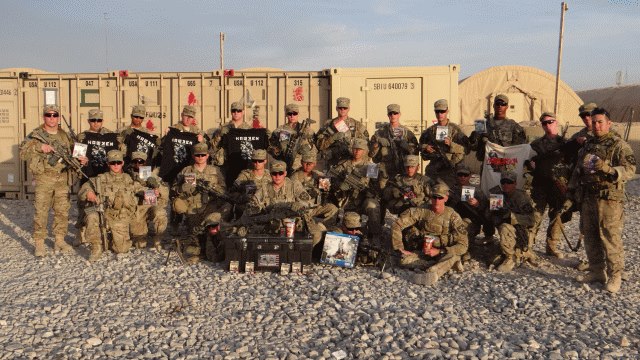
“It lets them know that, despite the fact that many dislike what we do, there is an appreciation for our actions and cause. People out there are thinking of us, and not sending random items ‘thinking of us’, but actually putting us into consideration.” – Simmons
The situation of Simmons is not unique. Alan Thomas, an Army infantry officer, had a similar experience. “The purpose behind getting OSD,” he says, “was to supply my Platoon with the ability to forget that they are in a hostile zone in the middle of nowhere. Forget the putrid smell everywhere, the physical and mental stress of the job, and to not always feel like at any point you could die.” As a Rifle Platoon Leader, Thomas is familiar with the stresses of being actively deployed. Aside from living in complete solitude with no electricity or air conditioning, Alan also had to take charge of the troop’s patrol days. “I cannot convey the sheer intensity…the feeling, the understanding between each other that this could be the day where we lose another brother.” He continues, “Even when we get back to camp it’s hard to shake that feeling off, even once we ground our boots back on the COP and de-kit. Games did the job to immediately take the edge off. How does one go from a life or death mission to relaxation de-stress time fast enough to have enough mental recuperation for the next round? It’s not easy. The OSD [package] I got from Stephen did just that.”
Thomas went on to say that Operation Supply Drop is a combat multiplier, or something that can actually help bolster the troops’ overall performance. “Being physically fit is a combat multiplier in that if a soldier is more fit he can carry more ammo, he can run faster and longer.” So how do the games sent to them through Operation Supply Drop do that? They relieve stress, something that can profoundly improve mental performance for leadership and decision making in combat. “It doesn’t matter if you’re taking direct fire, if you came feet from a detonating RPG, or an IED almost turned everyone in the vehicle into spaghetti. OSD helped my infantry Soldiers shed that lingering feeling that they almost died out there. It’s very important because without morale…we’re basically zombies droning along.”
“The purpose behind getting OSD was to…forget the putrid smell everywhere, the physical and mental stress of the job, and to not always feel like at any point you could die.” – Thomas
“There is something to be said when you walk down the hall and hear the laughter and smack talk going from room to room,” says army infantryman Martin Hughes, who served as the Platoon Sergeant for a Personnel Security Detachment. His platoon conducted operations all over the province of Paktya in Afghanistan. “They were expected to be on call and move faster than any unit on the ground.. OSD was a huge relief.”
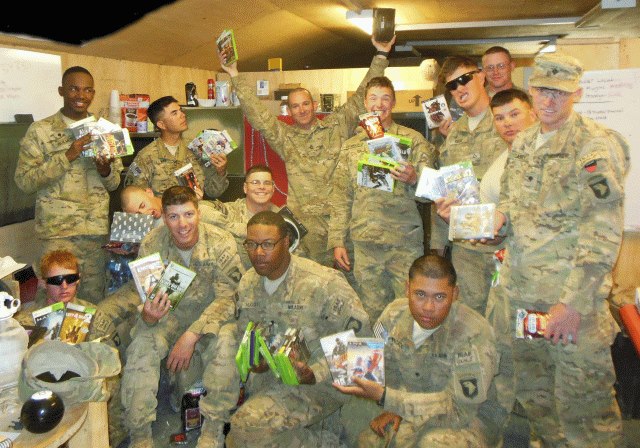
Since Hughes and his team were always on the move, it was almost impossible for them to receive packages from Amazon or other stores. “It was breathing room they needed when they are cramped in vehicles for 23 hours, driving or gunning, dealing with the culture and language barriers with the locals. And of course being able to smash your Platoon Leader or Platoon Sergeant in the back of the head and get points for it has its own rewards for them as well I suppose.”
“OSD helped my infantry Soldiers shed that lingering feeling that they almost died out there. It’s very important because without morale…we’re basically zombies droning along.” – Thomas
Operation Supply Drop sent Hughes’s platoon games like Dead Space 3, FIFA 2012, Call of Duty, and Borderlands 2, all of which gave them the ability to play together and solo, something he claims is necessary when you never have time to yourself. “I would like to thank OSD for the opportunity to be able to be a part of this great program. You helped my platoon, and my company ease our own stress and allowed us to do our job everyday with no issues. We all thank you for your continuing effort to help our soldiers overseas and allow them to focus on the mission.”
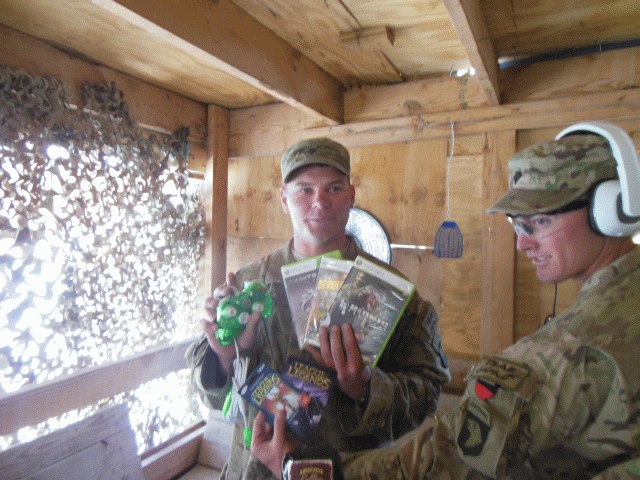
Working with Able Gamers: From War Time to Peace Time
Claycamp, Simmons, Thomas, and Hughes are but a small portion of the hundreds of American troops Operation Supply Drop has sent care packages to. When I asked Machuga what his plans are for the future of the charity, he was quick to mention that things are changing. “With the formal end of combat operations in Afghanistan happening probably in the fiscal year 2015, the charity has to change its focus,” he explains. “We need to transition from a war time environment to peace time, so we started working with Walter Reed and Fort Belvoir military hospitals to try to help the troops who have already served and are now recovering from injuries they have suffered from over there.” It was this need to adapt to the changing climate of war that a connection with the AbleGamers charity was established.
“It was breathing room they needed when they are cramped in vehicles for 23 hours, driving or gunning, dealing with the culture and language barriers with the locals.” – Hughes
AbleGamers is a nonprofit charity that seeks to improve the lives of people with disabilities through the use of video games. The charity works to increase accessibility in the field of gaming so that the medium can be used equally by everyone. Although still in its infancy, a team that involves both AbleGamers and Operation Supply Drop makes perfect sense. Many soldiers returning from deployment must deal with life-altering injuries that can prevent them from enjoying video games in ways others normally take for granted. That is something AbleGamers can help fix by providing gaming peripherals such as modified controllers or motion control to increase the overall accessibility of Operation Supply Drop’s care packages.
“We’re working closely now with Mark Barlet from Able Gamers. He is probably going to be on our board of directors pretty soon; he really likes what we’re doing and he wants to get involved,” explains Machuga. Barlet, who is also a veteran, does not have access to the military hospitals that Machuga does. Together, both charities can help extend each other’s reach. “I can work closely with the hospitals and he [Barlet] can work on the accessibility side of things — you know with any kind of disabilities. A lot of people returning from downrange have injuries that leave them disabled or incapacitated in one way or another. So it is a very fitting marriage between the two organisations, and we’re working on formalising everything right now.” Together, Barlet and Machuga are going to push the benefits of games even further.
Making Games Make a Difference
Perhaps if we move away from blatant finger pointing and into a discourse of what games have the capacity to do, we will be able to move the medium forward on a more positive, and beneficial, note. Organisations like Operation Supply Drop are ultimately helping to move us in that direction. Currently the charity is preparing for their Veteran’s Day 8-bit Salute, an annual event that last year raised $US58,000 dollars in games donations.
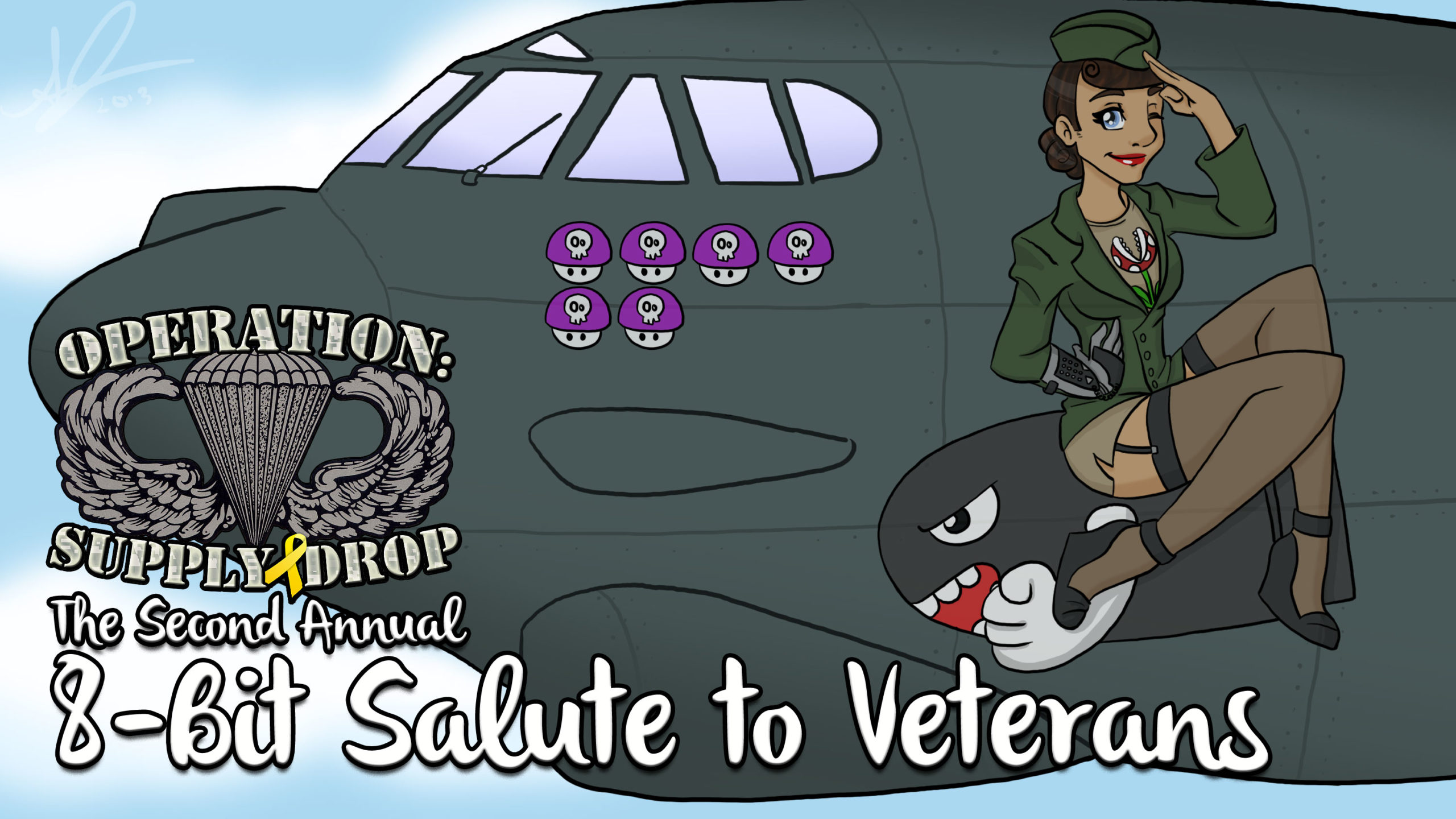
This year it is happening the weekend of November 10th. Machuga explains, “We’re trying to reach out to different organisations. We’ve already got the thumbs up from Los Vegas and LA, they are looking to help out again. We’re also looking into moving away from live events and moving into Twitch live streams.” If you’re interested in finding out more about Operation Supply Drop and how you can help make a difference you can find more information at OperationSupplyDrop.org.
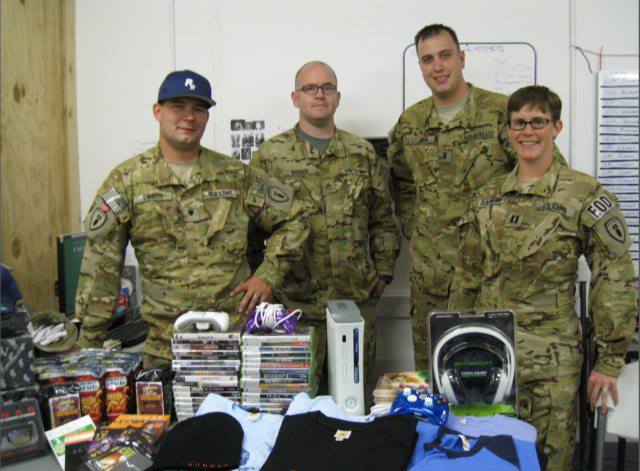
Bolstering troop morale, combating PTSD and depression, aiding injured veterans in hospitals — these are but a fraction of the way video games can make a positive impact. Machuga, his love of games, and his goals behind Operation Supply Drop are helping in that endeavour. Care package by care package. Person by person. Games provide a release from the daily stresses of life regardless of who or where you are, but when pushed to make a difference, they can change lives for the better. Sitting in the comfort of our own homes, it can be difficult to see how something we take for granted can transform lives. However, through the accounts of individuals like Claycamp, Simmons, Thomas, and Hughes, who risk their lives in order to preserve Americans’ own, we witness the tangible influence games have on humanity.
Katy Goodman is a freelance writer and graduate student at Auburn University. When she isn’t busy training birds of prey or freshman composition students, she can be found playing video games. She also really likes chocolate milk. Follow her on Twitter @InvizzyB or on her blog, Pixel Hearts.
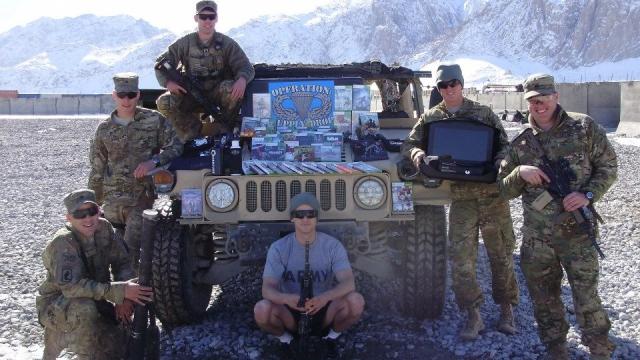
Comments
2 responses to “How Video Games Help Soldiers Deal With The Horrors Of War”
I played a LOT of Fallout 3/New Vegas on my laptop (in spite of the terrible performance and lack of access to patches) when I was there, so I can relate. Now games help to provide a distraction from the sense of boredom and indifference I feel towards everyday life a lot of the time. I understand that this is a common problem for people who’ve been out seeing “action” (for lack of a better word) and then try to reintegrate into polite society. I really do hate COD and other war-games though, for their insistence on turning their depiction of combat into an overblown, cheesy series of dramatic set-pieces. All it does is feed dumb stereotypes and encourage wannabes, but I guess that sells. I’ll stick to wasting dragons and aliens myself, I don’t really get off on wasting imaginary people because it just feels kind of… sick. Maybe because I never killed anyone IRL, who knows?
Great article guys, must be hell out there… You don’t see stories like this in the media, since you know, games are responsible for all the evil in the world apparently >.>
and here the media had me thinking it made them into bloodthirsty killers